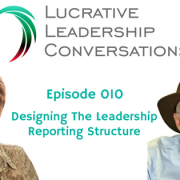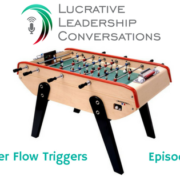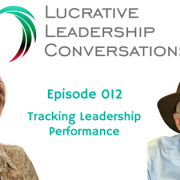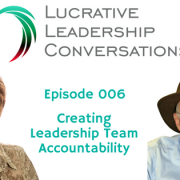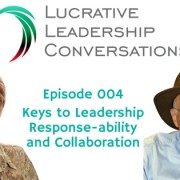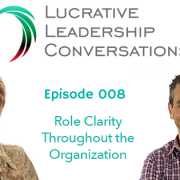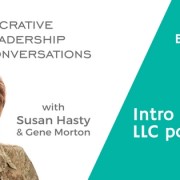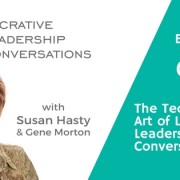005 | Foundational Business Outcomes for Leadership
Welcome back to the Lucrative Leadership Conversations podcast! Over the past two episodes, we have discussed how leaders can master change by leveraging their conversations to impact others within the organization. Today, we look at one of the most critical decisions of effective leadership: Creating foundational business outcomes.
My co-host, Gene Morton, has developed the Leaders First Process, which includes “6 Bold Steps” leaders can take to sustain performance and create a collaborative structure that aligns with your vision. In episode 4, we introduced the 6 Bold Steps with Step #1: Leaders agree to commit to personal responsibility. Today, we introduce and unpack Step #2: Defining critical business outcomes. Gene and I discuss what these critical outcomes are, what they are not, and how they act like a compass pointing toward profitability. Developing critical business outcomes will allow leaders to greatly improve Clarity and Focus within their organization.
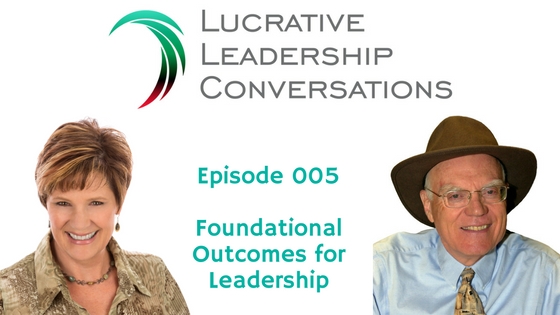
The Critical Nature of Effective Business Outcomes
Developing clear, precise business outcomes within your leadership team and organization is a critical step in building and maintaining company growth and prosperity. According to Gene, it is the foundation that a leadership team needs in order to begin the strategic planning process that will lead to the implementation and deliverance of the outcomes to a company’s customers. Today, Gene shares with us how developing clear outcome statements differ from other types of statements often used within a company’s industry, such as ethical statements. He defines exactly what an outcome statement is as well as how defining and clarifying your business outcomes will lead to further growth and development.
Here’s a Breakdown of Today’s Episode:
- What “business outcomes” are – and what they are not.
- How does the leadership structure and process compare to strategic planning?
- What is leadership structure and why is it important?
- How Gene learned that leadership structure is often missing from strategic planning within organizations.
- How business outcomes differ from a company’s goals and visions.
- Why defining an organization’s outcome statements is the core step in the Leaders First process?
- How will an organization know when they have effective outcomes?
- Why it is essential that the leadership team participate in creating outcomes.
- How long does it typically take to develop a company’s outcome statements?
- Actionable steps you can take today to help you being developing clear outcomes.
“You want your outcome statements to be as precise as a knife’s edge.” – Gene Morton
5 Critical Characteristics of Well-Defined Business Outcomes:
- Outcomes have been written down. (Don’t rely on the leadership team’s memory!)
- Leaders agree on the outcome.
- The business outcomes are something that is desired by your customers.
- The outcome is timeless. (Once the outcome is developed and implemented, it remains relevant for many years.)
- Your business outcomes are independent of any single function or role.
Critical Business Outcomes Are Not:
- Daily tasks, duties, or responsibilities.
- Financial or operational goals and objectives (If a goal does not lead to an outcome or delivery, it is either wrong or irrelevant. Outcomes supersede goals.)
- General or superficial statements of values, platitudes, or beliefs. (Outcomes are not the same as ethical statements.)
- Theoretical or abstract ideas.
- “High-sounding” company slogans.
“Developing outcome statements requires heart work and head work.” – Gene Morton
Today’s Takeaway:
The next time you are in a meeting, ask “What is our outcome for this session?” Then, continue to ask the same question at each meeting or exchange that you are involved in. This will help you to start thinking about your critical business outcomes.
Helpful Links & Resources:
About the Hosts:
SUSAN HASTY
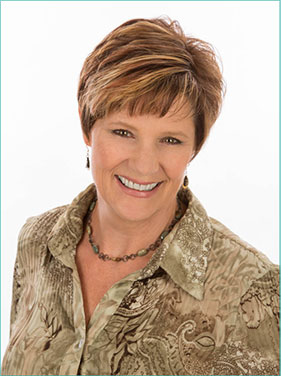
Susan Hasty is the CEO of 360 Profit Masters and the host of the Lucrative Leadership Conversations podcast. Susan considers herself a “maverick leader” on a mission to inspire and equip leaders to ignite their leadership genius. Susan co-founded 7 business ventures over the last 35 years. Her passion is helping business owners and CEOs improve their own clarity, focus and commitment to build more sustainable organizations empowered to make economic liberty a reality. She is certified in Neurolinguistic Programming and is a Strategic HR Business Partner by the Human Capital Institute. She is a member of the Marshall Goldsmith Stakeholder Centered Coaching Network of International Leadership coaches.
Ready to your business more profitable? Schedule a free call with Susan Hasty
GENE MORTON
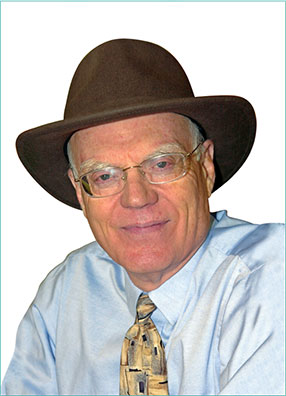 Gene Morton is an organizational psychologist based out of Colorado. He is also an award winning author of the book, Leaders First: Six Bold Steps to Sustain Breakthroughs in Construction. Over the past 40 years, Gene has consulted on more than 100 projects in 85 organizations with leader groups engaged in complex mergers, reorganizations, leadership turnarounds, and system redesigns.
Gene Morton is an organizational psychologist based out of Colorado. He is also an award winning author of the book, Leaders First: Six Bold Steps to Sustain Breakthroughs in Construction. Over the past 40 years, Gene has consulted on more than 100 projects in 85 organizations with leader groups engaged in complex mergers, reorganizations, leadership turnarounds, and system redesigns.
He developed the Leaders First Alignment Process to provide leadership teams the model they need to gain clarity as the organization evolves. His passion is mastering the complexities of organized and collaborative leadership.
Connect With Us
Subscribe to itunes Subscribe to stitcher Subscribe to Google Play
Straight forward leadership advice
Learn a simpler, more practical approach to building your leadership team strength... Delivered straight to your inbox!

